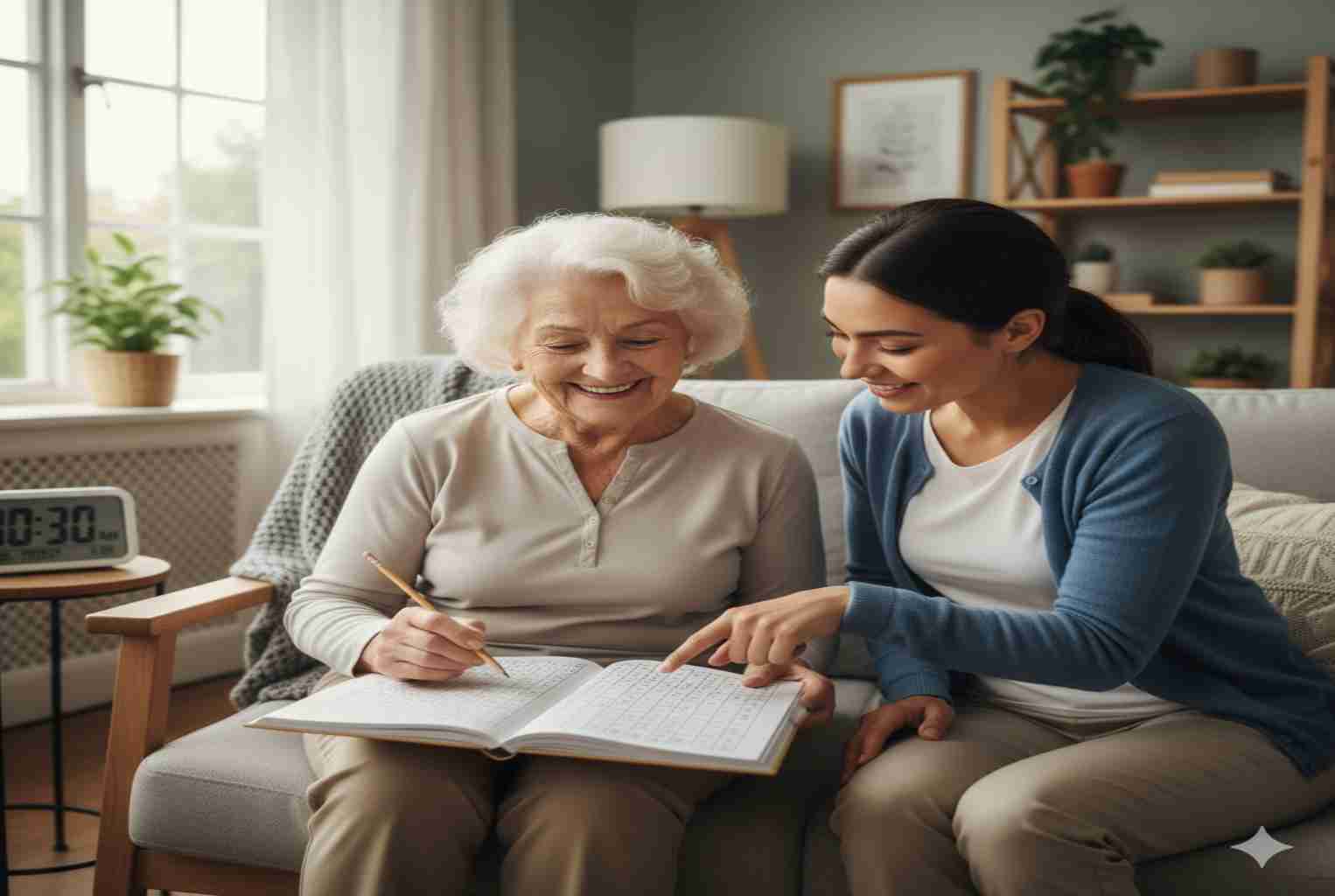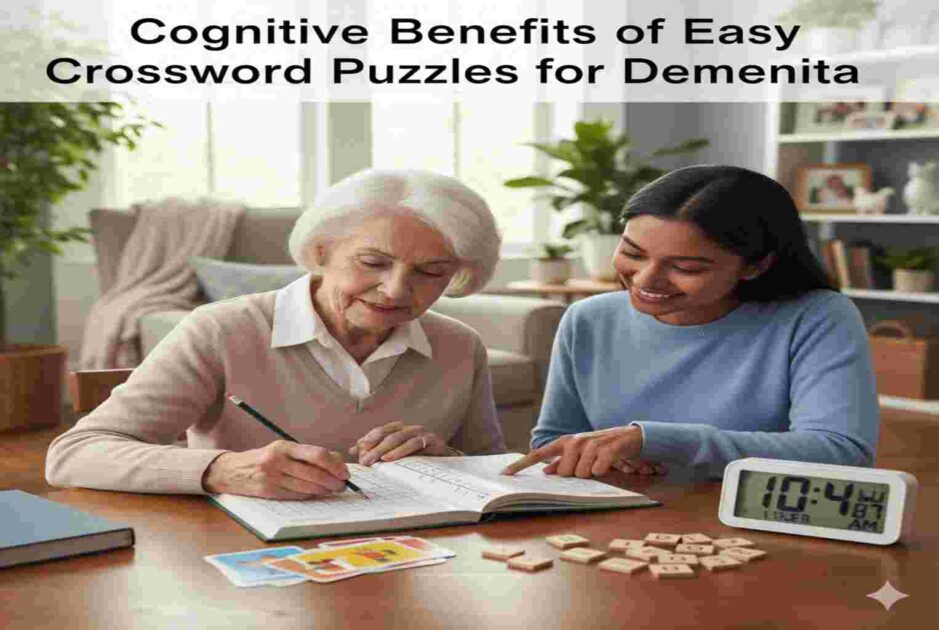Easy crossword puzzles dementia patients enjoy can become more than just games; they can be puzzles and tools for memory support, mental stimulation, and emotional well-being.
Crossword puzzles are widely recognized as beneficial for cognitive health, especially for older people living with dementia.
By focusing on simpler versions designed with accessibility in mind, caregivers and families can provide a fun and stimulating activity that enhances daily life while reducing frustration.
Why Easy Crossword Puzzles Are Important for Dementia Care
Dementia can make once-simple tasks overwhelming. Standard crossword puzzles may feel too complex, but easy crossword puzzles for dementia patients strike the right balance between challenge and accessibility. These puzzles help:
- Encourage memory recall without stress
- Strengthen problem-solving skills
- Promote focus and concentration
- Offer a sense of achievement and confidence
- Reduce boredom and agitation
Such benefits align with other therapeutic activities like yoga exercises for dementia and music therapy for dementia care, both of which improve mental well-being.
Cognitive Benefits of Easy Crossword Puzzles for Dementia
1. Enhancing Memory Recall
Puzzles often use familiar words, themes, or clues that spark recognition. This gentle mental exercise reinforces memory pathways and slows cognitive decline.
2. Boosting Language Skills
Crossword puzzles naturally support vocabulary and word recognition. For dementia patients, this helps preserve communication skills, which are essential for social interaction.
3. Encouraging Problem-Solving
Each clue challenges the brain to make connections, enhancing logical thinking and reducing cognitive stagnation.
4. Providing Stress Relief
Engaging in a calm, structured puzzle reduces anxiety, similar to the effects seen in therapeutic activities for dementia.
Emotional and Social Impact of Crossword Puzzles
Dementia care goes beyond brain health—it also requires emotional connection. Crossword puzzles can:
- Create bonding moments between caregivers and patients
- Offer a shared activity that fosters social interaction
- Improve mood by offering a sense of accomplishment
- Provide routine and structure, which dementia patients find comforting
Similar effects are seen in group activities like dementia-friendly board games and storytelling activities, where fun is paired with memory support.
How to Choose Easy Crossword Puzzles for Dementia Patients
When selecting crossword puzzles, caregivers should consider:
- Font Size: Large-print puzzles reduce visual strain.
- Difficulty Level: Choose puzzles with simple clues and common words.
- Themes: Use familiar topics such as food, nature, or family.
- Length: Shorter puzzles avoid fatigue or frustration.
- Interactive Formats: Printable or app-based puzzles allow flexibility.
Tips for Using Crossword Puzzles in Dementia Care
- Set aside a regular puzzle time each day to create a routine.
- Pair puzzles with calming background music to enhance focus.
- Work collaboratively to reduce pressure and make it fun.
- Use puzzles as part of a larger activity calendar, like activity schedules for older people with dementia.
- Encourage breaks and celebrate small successes.
Crossword Puzzles vs. Other Dementia Activities
Crossword puzzles are effective, but they work best when combined with other activities. For example:
- Physical activities: Exercises for dementia patients help improve circulation and reduce restlessness.
- Creative arts: Watercolor painting supports expression and relaxation.
- Reminiscence therapy: Tools like a memory box connect puzzles with personal history.
This variety ensures a balanced approach to cognitive care.
Real-Life Examples of Crossword Puzzle Success in Dementia
Families often report that their loved ones regain moments of clarity while working on puzzles. Care homes have also integrated crossword activities into group sessions, noting improved participation, mood, and reduced agitation.
Additionally, combining crossword puzzles with pet therapy for dementia or cooking activities can further enhance engagement by appealing to multiple senses.
FAQs about Easy Crossword Puzzles for Dementia
1. Are easy crossword puzzles suitable for all dementia stages?
Yes, they can be adapted for early and moderate stages, but very advanced stages may require simpler activities.
2. How often should dementia patients do crossword puzzles?
Daily short sessions (10–20 minutes) are ideal for maintaining consistency without fatigue.
3. Do crossword puzzles slow down dementia progression?
They cannot stop progression, but they help stimulate the brain and preserve skills longer.
4. Can crossword puzzles reduce agitation in dementia patients?
Yes, they provide focus and structure, reducing anxiety and restlessness.
5. Are digital crossword apps good for dementia care?
Yes, if they offer large fonts, easy navigation, and simple clues.
6. How do crossword puzzles compare to memory games?
Both are effective; crosswords target language, while memory games strengthen recall directly.
7. Can crossword puzzles be used in group dementia therapy?
Absolutely, group sessions enhance social interaction and teamwork.
8. Are crossword puzzles safe for dementia patients with vision problems?
Yes, provided large-print versions or audio-assisted puzzles are used.
9. What themes work best for dementia-friendly crosswords?
Simple and familiar themes like food, animals, seasons, and family.
10. Should crossword puzzles replace other dementia activities?
No, they should complement activities like gentle exercise and social interaction.
Conclusion
Easy crossword puzzles dementia patients enjoy are more than simple games—they are tools for memory preservation, emotional support, and joyful engagement. Whether used at home or in care facilities, they provide comfort, routine, and a sense of accomplishment.
When combined with other supportive approaches like natural remedies for dementia or therapeutic activities, crossword puzzles can significantly improve quality of life.
By incorporating these puzzles into daily routines, families and caregivers can give their loved ones with dementia meaningful ways to stay connected, stimulated, and happy.

